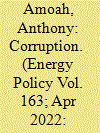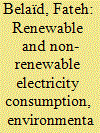|
|
|
Sort Order |
|
|
|
Items / Page
|
|
|
|
|
|
|
| Srl | Item |
| 1 |
ID:
183620


|
|
|
|
|
| Summary/Abstract |
Increasingly, a significant part of the literature on corruption establishes a negative relationship between corruption and economic variables. However, empirical research showing the influence of corruption on renewable energy consumption is useful because of the global interest in achieving a low-carbon and clean environment. In this light, we model a relationship between corruption and renewable energy consumption (% of total final energy consumption) in Africa. Using a panel dataset for 32 African countries covering the period 1996–2019, we first show that perception about corruption is relatively high in Africa. In line with corruption theory, both Generalized Method of Moments and Instrumental Variable estimation techniques are used to establish that corruption is inimical to the share of renewable energy consumption in total final energy consumption in Africa. To investigate the robustness of the results, we disaggregate the sample into high and low environmental performance countries as well as upper and lower-middle-income countries and still find consistent results. Our results call for strategic policies and institutional structures that seek to prevent corruption from further permeating the continent's administrative structures.
|
|
|
|
|
|
|
|
|
|
|
|
|
|
|
|
| 2 |
ID:
161485


|
|
|
|
|
| Summary/Abstract |
The aim of this article is to empirically shed light on the impacts of trade openness (TO) on facilitation of renewable energy transition (RET) across Bangladesh, India, Pakistan, Sri Lanka and Nepal. Against this backdrop, this article incorporated annual time series data stemming from 2000 to 2017 and employed the two-stage least squares (2SLS) panel data estimation methodology. In addition, the panel Granger causality test was also applied to distinguish the possible long-run causal associations between the variables considered in the regression models. In the light of the estimated results, it is found that an improvement in TO triggers renewable energy consumption, improves the primary energy-use efficiency and elevates the access to clean cooking fuel technology within the selected South Asian economies. However, the results also led to the concerning conclusion regarding the ineffectiveness of the trade liberalization policies in curbing the relative consumption of non-renewable energy resources, thereby marginalizing the prospects of overall RET within these economies.
|
|
|
|
|
|
|
|
|
|
|
|
|
|
|
|
| 3 |
ID:
125874


|
|
|
|
|
| Publication |
2013.
|
| Summary/Abstract |
We estimate the short-run and long-run elasticities of various types of energy consumption and energy R&D to changes in oil prices and income of the 20 OECD countries over the period of 1980-2010 using the Nerlove partial adjustment model (NPAM). We find negative income elasticity for coal consumption but positive income elasticity for oil and gas consumption suggesting the importance of economic growth in encouraging the usage of cleaner energy from coal to oil and gas. By introducing time dummies into the regressions, we show that climatic mitigation policies are able to promote the usage of cleaner energies. Through the dynamic linkages between energy consumption and energy R&D, we find that fossil fuel consumption promotes fossil fuel R&D and fossil fuel R&D in turn drives its own consumption. Renewable energy R&D which is more responsive to economic growth reduces fossil fuel consumption and hence fossil fuel R&D.
|
|
|
|
|
|
|
|
|
|
|
|
|
|
|
|
| 4 |
ID:
111388


|
|
|
|
|
| Publication |
2012.
|
| Summary/Abstract |
This study examines the degrees of time persistence in U.S. total renewable energy consumption using innovative fractional integration and autoregressive models with monthly data from 1981:1 to 2010:10. The results indicate that renewable energy consumption is better explained in terms of a long memory model that incorporates persistence components and seasonality. The degree of integration is above 0.5 but significantly below 1.0, suggesting nonstationarity with mean reverting behavior. The presence of long memory behavior (persistence) in renewable energy consumption suggests that random shocks may very well move renewable energy consumption from pre-determined target levels for a period of time.
|
|
|
|
|
|
|
|
|
|
|
|
|
|
|
|
| 5 |
ID:
128030


|
|
|
|
|
| Publication |
2014.
|
| Summary/Abstract |
This paper attempts to explore the determinants of CO2 emissions using the STIRPAT model and data from 1980 to 2011 for OECD countries. The empirical results show that non-renewable energy consumption increases CO2 emissions, whereas renewable energy consumption decreases CO2 emissions. Further, the results support the existence of an environmental Kuznets curve between urbanisation and CO2 emissions, implying that at higher levels of urbanisation, the environmental impact decreases. Therefore, the overall evidence suggests that policy makers should focus on urban planning as well as clean energy development to make substantial contributions to both reducing non-renewable energy use and mitigating climate change
|
|
|
|
|
|
|
|
|
|
|
|
|
|
|
|
| 6 |
ID:
168701


|
|
|
|
|
| Summary/Abstract |
In this article, we develop an empirical model to investigate the causal link amid renewable and non-renewable electricity consumption, GDP and carbon emissions by using a panel of 9 Mediterranean countries over the period 1980–2014. Using the PMG panel ARDL and panel econometric technics, heterogeneity and cross-sectional dependence among the panel were considered to explore the long and short-run dynamic relationships as well as the validity of a proposed model. The results provide panel empirical evidence that there is short-term bidirectional causality between GDP, renewable electricity consumption and CO2 emissions and between non-renewable electricity consumption, GDP and renewable electricity consumption. For the long-term causal relationship, the result indicates that there is bidirectional causality between non-renewable electricity consumption and CO2 emissions. However, there is evidence of unidirectional causal relationships from GDP to CO2 emissions and non-renewable electricity consumption and from renewable electricity consumption to CO2 emissions. The findings imply that non-renewable electricity consumption and economic growth stimulate CO2 emissions in southern and northern Mediterranean countries, while renewable electricity reduces them. This empirical evidence suggests that expansion of renewable energy sources is a viable strategy for addressing energy security and reducing carbon emissions to protect the environment for future generations.
|
|
|
|
|
|
|
|
|
|
|
|
|
|
|
|
| 7 |
ID:
093546


|
|
|
|
|
| Publication |
2010.
|
| Summary/Abstract |
This study examines the relationship between renewable energy consumption and economic growth for a panel of twenty OECD countries over the period 1985-2005 within a multivariate framework. Given the relatively short span of the time series data, a panel cointegration and error correction model is employed to infer the causal relationship. The heterogeneous panel cointegration test reveals a long-run equilibrium relationship between real GDP, renewable energy consumption, real gross fixed capital formation, and the labor force with the respective coefficients positive and statistically significant. The Granger-causality results indicate bidirectional causality between renewable energy consumption and economic growth in both the short- and long-run.
|
|
|
|
|
|
|
|
|
|
|
|
|
|
|
|
| 8 |
ID:
176705


|
|
|
|
|
| Summary/Abstract |
The existing literature on renewable energy consumption and economic growth nexus produces mixed results as the effect of renewable energy consumption on economic growth can be either positive, negative or not significant. This paper examines the causal link between renewable energy use and economic growth by employing a threshold model using a 103-country sample in the 1995 to 2015 period. We find that the relationship between renewable energy consumption and economic growth depends on the amount of renewable energy used. Our results demonstrate that the effect of renewable energy consumption on economic growth is positive and significant if and only if developing countries or non-OECD countries surpass a certain threshold of renewable energy consumption. However, if developing countries use renewable energy below a given threshold level, the effect of renewable energy consumption on economic growth is negative. However, we also find that renewable energy consumption has no significant effect on economic growth in developed countries and a positive and significant effect on economic growth in OECD countries. The findings of this paper suggest that for developing countries to realize positive economic growth from their investment to renewable energy, they need to surpass a certain threshold of renewable energy consumption.
|
|
|
|
|
|
|
|
|
|
|
|
|
|
|
|
| 9 |
ID:
167003


|
|
|
|
|
| Summary/Abstract |
A major challenge facing humans in the 21st century is how to strike a balance between the mitigation of environmental degradation and the achievement of sustainable economic growth. On this note, this investigation applies an autoregressive distributed lag (ARDL) methodology to a panel data of 28 European Union (EU-28) countries over the period 1995–2015. The study confirms the existence of positive and significant long-run nexus among environmental sustainability, renewable energy consumption and economic growth in the EU-28 countries. In addition, empirical results indicate that real gross fixed capital formation, carbon emissions and other environmental factors are principal determinants of long-run growth in the EU. Using Dumitrescu and Hurlin (2012) Granger non-causality in heterogeneous panel, results show long-run bidirectional causal relationships among renewable energy consumption, economic growth and other growth determinants. Based on these results, we infer that the exploitation of renewable energy sources in the EU-28 countries is a reliable pathway toward environmental pollution mitigation. Consequently, achieving sustainable development goals (SDGs) by the year 2030 through renewable energy consumption and carbon emission mitigation is very much achievable in the EU-28 countries, and should also be adopted by all countries as an effective global policy.
|
|
|
|
|
|
|
|
|
|
|
|
|
|
|
|
|
|
|
|
|